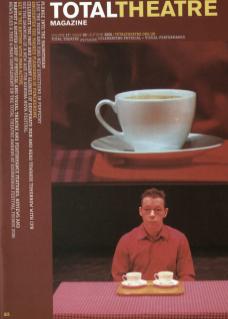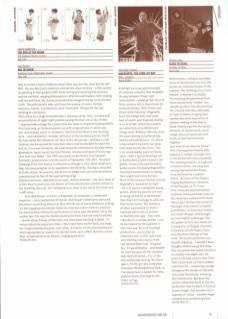How to review a Laurie Anderson show? What was she like, what did she do? Well, she was like Laurie Anderson and she did what she does – softly spoken storytelling in that gorgeous NYC drawl mixing and matching the personal and the political, merging philosophical reflection and modern myth-making with wit and irony, her stories punctuated by energetic bursts on her electric violin. The performance ebbs and flows like a piece of music; melody, harmony, rhythm, counterpoint; each ‘movement' fitting with the last, building to conclusion. She's alone on a stage furnished with a Jackanory wing-chair, screen and a constellation of night-light candles turning the floor into a sky of stars – appropriately enough for a piece that was made in response to being NASA's first and only (as Anderson points out with a typical take-it-which-way-you-will twinkle) artist-in-residence. The End of the Moon is the resulting work – and inevitably it includes reflection on the residency process itself. We hear about the telephone call that starts the journey – perhaps a cruel trickster has discovered her innermost desire and has decided to tease her, but no, it is a real invitation. We understand the relevance to the baby-boom generation: space travel, the final frontier, dreams and hopes of a new age that have now faded – the 1969 moonwalk sandwiched in time between Kennedy's assassination and the events of September 11th 2001. The plane-bombing of the twin towers is reflected on through a story about Anderson's dog. Accompanying her on an expedition into the wilds, the dog is attacked by birds of prey. He survives, but he can no longer look up to the sky without experiencing the fear of the approaching wings. Airborne terrorists, depleted ozone layer, shuttle disasters – the sky's more of a limit than it used to be; but there's still the eternal past-present-future in the twinkling stars lull-lull-lullabying us to sleep to the sound of a violin and soft voice,
So to Bob Karper: one man, a keyboard, an accordion, a screen and projector – and a bucketload of stories. Bob Karper's beating his own path, but there's something about him that reminds me of Laurie Anderson; perhaps it's the engaging and melodic American voice but more I think it's because his musicianship informs his performance in every way, the poetic lilt to the spoken text; the way the rhythms build as he flows from one tale to another – stories about friends called Steve and time spent teaching in Japan. I'm unsure about the projected slides – the screen feels too far back, too large, the images lacking sharpness and colour. A smaller screen would perhaps be more appropriate to capture the desired home-spun effect. But this is more than compensated for by Karper's engaging presence.

